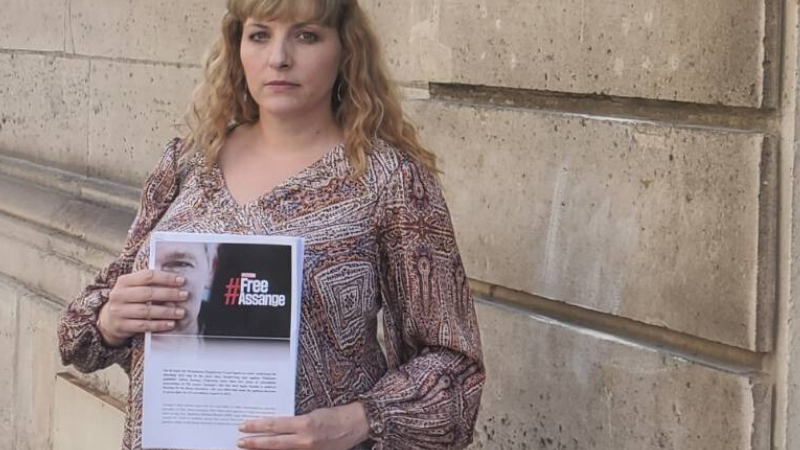Time is running out for Wikileaks publisher Julian Assange in his bid to avoid extradition to the United States.
On 17 and 18 May, Reporters Without Borders (RSF) representatives in seven countries delivered a petition signed by nearly 64,000 supporters around the world urging UK Home Secretary Priti Patel not to sign the extradition order, and to protect journalism and press freedom by releasing Assange without further delay.
RSF gathered in London with other NGOs who had signed a separate joint letter to Patel and attempted to deliver the petition directly to the Home Office, which refused to accept it. Representatives of RSF submitted it by email and post, and delivered the same petition to the British embassies in Washington, D.C., Paris, Berlin, Madrid, Rio, and Algiers.
The Shift’s founder and editor Caroline Muscat is currently in Paris supporting the international initiative.
Assange’s legal team had unsuccessfully appealed to the UK’s Supreme Court in March following the High Court’s decision to approve his extradition, overturning a previous District Court ruling that prohibited extradition on the basis of serious concerns over Assange’s mental health.
The Westminster Magistrates’ Court issued an order on 20 April referring the issue back to the Home Office. Assange’s defence was given four weeks to make submissions, after which the decision to sign off on the extradition was in the hands of the Home Secretary, who could sign or reject the order at any point.
RSF launched a new #FreeAssange petition, urging supporters to sign before 18 May.
That’s it: the clock is set. As of tomorrow, @pritipatel can sign or reject extradition at any point.
It’s not too late to sign @RSF_inter’s petition urging her to protect journalism + press freedom by rejecting extradition: https://t.co/AXFwSYhejJ
We’ll deliver it tomorrow! https://t.co/UxAla8KOKZ
— Rebecca Vincent (@rebecca_vincent) May 17, 2022
“We are grateful to supporters from around the world for signing this petition and adding their voices to the global call on the UK government not to extradite Julian Assange,” RSF Director of Operations and Campaigns Rebecca Vincent said.
She added that “The message is clear: a move to extradite Assange would be a move against journalism and press freedom. We call on Priti Patel to reject the extradition order and secure Assange’s immediate release and will continue our global campaign until he is free.”
The Council of Europe Commissioner for Human Rights, Dunja Mijatović, said that the wider human rights implications of extraditing Assange “had not yet been adequately considered”, and his indictment by the US “raised important questions about the protection of those that publish classified information in the public interest, including information that exposes human rights violations.”
“Allowing Mr Assange’s extradition on this basis would have a chilling effect on media freedom,” she said, “and could ultimately hamper the press in performing its task as purveyor of information and public watchdog in democratic societies.”
Assange has been battling the extradition request for years following relentless persecution against him due to his publication of classified US military files. The leaks on Iraq alone amounted to a total of 4,000,000 documents from the US Department of Defence, and exposed war crimes committed in the Middle East.
If extradited to the United States, Assange would be prosecuted on 18 charges related to Wikileaks’ 2010 publication of hundreds of thousands of leaked classified documents that informed extensive public interest reporting around the world.
He faces up to 175 years in prison and would be the first publisher prosecuted under the US Espionage Act, which lacks a public interest defence.












